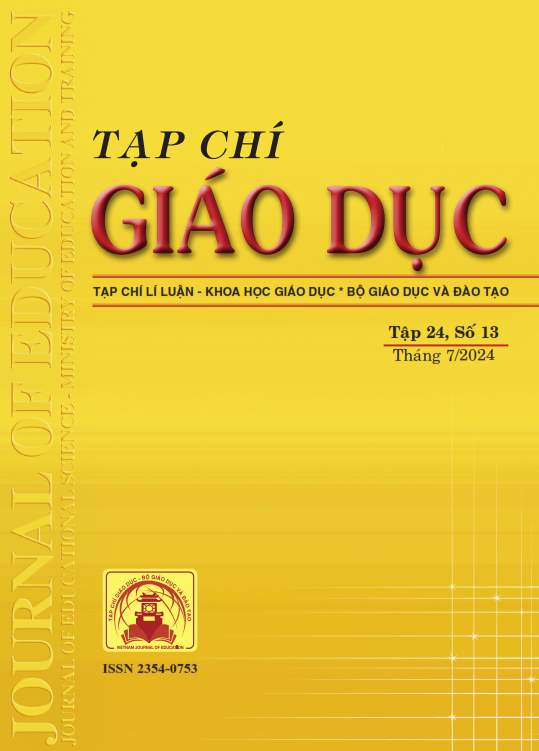Những giá trị của hướng tiếp cận Reggio Emilia trong giáo dục mầm non và một số đề xuất
Tóm tắt
As preschool is a very important stage in children's comprehensive development, advanced preschool education is becoming a prominent topic in modern educational research. Reggio Emilia is a progressive approach to preschool education originally developed in Italy, with a philosophy that values the natural development of children through a diverse and stimulating learning environment. This article analyzes the values of the Reggio Emilia approach in the field of preschool education, pointing out the benefits the Reggio Emilia approach brings to the comprehensive development of children. Faced with the requirements for new educational innovation under the motto “learner-centered”, the Reggio Emilia approach is highly appropriate and should be applied in preschool education in our country today to bring about an active learning environment, helping children maximize creativity, cooperation skills, initiative, and confidence.
Tài liệu tham khảo
Bùi Thị Việt, Trần Thị Kim Huệ (2023). Thực trạng và biện pháp tổ chức hoạt động tạo hình cho trẻ 5-6 tuổi theo phương pháp Reggio Emilia ở một số trường mầm non thành phố Trà Vinh, tỉnh Trà Vinh. Tạp chí Giáo dục, số đặc biệt tháng 9, 207-213.
Cadwell, L. B. (2018). Phương pháp giáo dục Reggio Emilia (An Vi dịch). NXB Lao động.
Cutche, A. (2013). Art Spoken Here: Reggio Emilia for the Big Kids. NSEAD/John Wiley & Sons.
Edwards, C., Gandini, C., & Forman, G. (2012). The hundred languages of children: The Reggio Emilia approach Advanced reflections. Pareager Publisher.
Edwards, C., Gandini, L., & Nimmo, J. (1990). Loris Malaguzzi and the Teachers. Nebaraska Lincoln.
Inan, H. Z. (2009). Integrated Disciplines: Understanding the Role of Art in Science Education in a Preschool Hatice. Journal of Applied Sciences Research, 5(10), 1375-1380.
Manera, L. (2022). Art and aesthetic education in the Reggio Emilia Approach. Università degli Studi di Modena e Reggio Emilia.
Nguyễn Thị Thành (2022). Giới thiệu hướng tiếp cận Reggio Emilia và ứng dụng trong bối cảnh đổi mới giáo dục mầm non tại Việt Nam. Tạp chí Giáo dục, 22(6), 20-25.
Reggio Children and Project Zero (2001). Making learning visible. Harvard University.
Reggio Children Approach (n.d). Valori. https://www.reggiochildren.it/reggio-emilia-approach/valori/
Trần Thị Hằng (2017). Phát triển khả năng sáng tạo của trẻ trong hoạt động tạo hình của trẻ mầm non theo phương pháp Reggio Emilia. Tạp chí Giáo dục, số đặc biệt tháng 8, 42-44.
Trịnh Thị Xim (2021). Một số vấn đề liên quan đến quan điểm xây dựng chương trình giáo dục mầm non Ý (Italia) và đề xuất quan điểm xây dựng chương trình giáo dục mầm non Việt Nam sau 2020. Hội thảo “Đề xuất quan điểm xây dựng chương trình giáo dục mầm non sau 2020”. Bộ GD-ĐT, tr 75-87.
Vecchi, V. (2010). Art and Creativity in Reggio Emilia. Routledge, Taylor and Francis Group.
Wurm, J. P. (2005). Working in the Reggio Emilia way. Redleaf Press.
Yuntina, L. (2019). Early Childhood Education Management at the Kindergarten School. In Proceedings of the International Conference on Education, Language and Society, pp. 270-277. http://doi.org/ 10.5220/0008997602700277
Tải xuống
Đã Xuất bản
Cách trích dẫn
Số
Chuyên mục
Giấy phép

Tác phẩm này được cấp phép theo Ghi nhận tác giả của Creative Commons Giấy phép quốc tế 4.0 .












